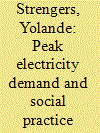| Srl | Item |
| 1 |
ID:
128416


|
|
|
|
|
| Publication |
2014.
|
| Summary/Abstract |
Air-conditioners and antibiotics are two technologies that have both been traditionally framed around individual health and comfort needs, despite aspects of their use contributing to social health problems. The imprudent use of antibiotics is threatening the capacity of the healthcare system internationally. Similarly, in Australia the increasing reliance on air-conditioning to maintain thermal comfort is contributing to rising peak demand and electricity prices, and is placing an inequitable health and financial burden on vulnerable heat-stressed households. This paper analyses policy responses to these problems through the lens of social practice theory. In the health sector, campaigns are attempting to emphasise the social health implications of antibiotic use. In considering this approach in relation to the problem of air-conditioned cooling and how to change the ways in which people keep cool during peak times, our analysis draws on interviews with 80 Australian households. We find that the problem of peak electricity demand may be reduced through attention to the social health implications of air-conditioned cooling on very hot days. We conclude that social practice theory offers a fruitful analytical route for identifying new avenues for research and informing policy responses to emerging health and environmental problems.
|
|
|
|
|
|
|
|
|
|
|
|
|
|
|
|
| 2 |
ID:
099359


|
|
|
|
|
| Publication |
2010.
|
| Summary/Abstract |
International mandates for smart metering are enabling variable and real-time pricing regimes such as dynamic peak pricing (DPP), which charges 10-40 times the off-peak rate for electricity during short periods. This regime aims to reduce peak electricity demand (predominantly due to increase in residential air-conditioning usage) and curb greenhouse gas emissions. Although trials indicate that DPP can achieve significant demand reductions, particularly in summer, little is known about how or why households change their cooling practices in response to this strategy. This paper discusses the outcomes of a small qualitative study assessing the impact of a DPP trial on household cooling practices in the Australian state of New South Wales. The study challenges common assumptions about the necessity of air-conditioning and impact of price signals. It finds that DPP engages households as co-managers of their cooling practices through a series of notification signals (SMS, phone, in-home display, email, etc.). Further, by linking the price signal to air-conditioning, some householders consider this practice discretionary for short periods of time. The paper concludes by warning that policy makers and utilities may serve to legitimise air-conditioning usage and/or negate demand reductions by failing to acknowledge the non-rational dynamics of DPP and household cooling practices.
|
|
|
|
|
|
|
|
|
|
|
|
|
|
|
|
| 3 |
ID:
112305


|
|
|
|
|
| Publication |
2012.
|
| Summary/Abstract |
Demand managers currently draw on a limited range of psychology and economic theories in order to shift and shed peak electricity demand. These theories place individual consumers and their attitudes, behaviours and choices at the centre of the problem. This paper reframes the issue of peak electricity demand using theories of social practices, contending that the 'problem' is one of transforming, technologically-mediated social practices. It reflects on how this body of theory repositions and refocuses the roles and practices of professions charged with the responsibility and agency for affecting and managing energy demand. The paper identifies three areas where demand managers could refocus their attention: (i) enabling co-management relationships with consumers; (ii) working beyond their siloed roles with a broader range of human and non-human actors; and (iii) promoting new practice 'needs' and expectations. It concludes by critically reflecting on the limited agency attributed to 'change agents' such as demand managers in dominant understandings of change. Instead, the paper proposes the need to identify and establish a new group of change agents who are actively but often unwittingly involved in reconfiguring the elements of problematic peaky practices.
|
|
|
|
|
|
|
|
|
|
|
|
|
|
|
|